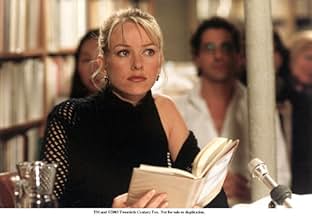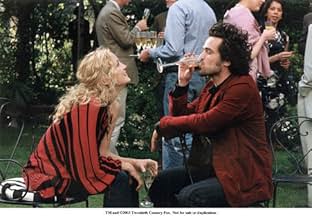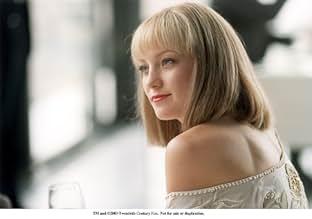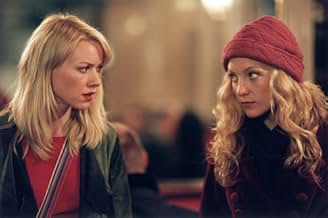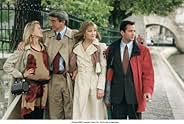IMDb-BEWERTUNG
4,9/10
12.432
IHRE BEWERTUNG
Französische vs. amerikanische soziale Bräuche und Verhaltensweisen werden in einer Geschichte über einen Amerikaner beobachtet, der ihre französische Schwester in Paris besucht.Französische vs. amerikanische soziale Bräuche und Verhaltensweisen werden in einer Geschichte über einen Amerikaner beobachtet, der ihre französische Schwester in Paris besucht.Französische vs. amerikanische soziale Bräuche und Verhaltensweisen werden in einer Geschichte über einen Amerikaner beobachtet, der ihre französische Schwester in Paris besucht.
- Regie
- Drehbuch
- Hauptbesetzung
- Auszeichnungen
- 2 wins total
Empfohlene Bewertungen
It's amusing to read some of the comments in this page of IMDb. Most postings place the blame for what they perceive as the failure of this picture on James Ivory, Ismael Merchant and Ruth Prawer Jhabvala, the successful creative team of some of the best movies of recent years. In fact, the sin they appear to have committed was to adapt the Diane Johnson's novel about the contrasts she has always written about between two cultures that should be more similar: the French and American, yet, as we read in the book, and now watched in the film, they are not as close as one would imagine.
First, the French one sees portrayed in the film belong to the high classes that are imbued in their traditions, savoir faire, their sense of style and being B.C.B.G., something the Americans, being somehow a new society without those traditions cannot comprehend. Money is a taboo subject to be spoken at all by the wealthy French, whereas in America the flaunting of having made fortunes and having millions is an everyday subject for the higher ups.
Ms. Johnson, who has lived in France for quite some time, is an observant of that society. In her many books about life in that country, the study in the contrasts she sees, are at center stage and the mixing of Americans with the French bourgeoisie produces surprising results that make the reading of her novels more compelling for the joy they bring to her readers.
Isabel, the young American, arriving to stay with her sister Roxanne, takes easily to the new surroundings. In doing so, she completely disregards the established rules when she enters in a liaison with Marc-Henri, who sees the occasion as one for amusing himself for a while. Roxanne, on the other hand, soon discovers what she is against when her French husband decides to ask her for a divorce. Little has prepared her for the consequences that go with it and the archaic laws about a couple's separation in that country, which benefits the husband while punishing the wife.
The other theme at the core of the story is a painting Roxanne has brought with her from San Diego. The possibility of it being a real Delacroix is now at the center of the divorce settlement. Where one can see it has nothing to do with the cheating husband, Suzanne, the mother-in-law deems otherwise because of the possible value the painting will fetch when it's sold.
Naomi Watts makes another great contribution in her appearance as Roxanne. Kate Hudson is not in the same league, although her good looks and natural charm makes one care more for her Isabel. The delicious Leslie Caron plays Madame de Persand with great panache. Just watching her remarking about the granulated sugar Charlotte offers her to sweeten her tea is one of the delights of the film. Tierry Lhermitte is seen as the callous Edgar. Glenn Close plays Olivia Pace, a writer,who might be Diane Johnson's alter ego in the story. Stephen Fry, Stockard Channing, Sam Waterston, and the rest of the French and American cast do a good job.
This film has a feeling of being more French than some French movies. The cinematography of Pierre Lhomme is wonderful as he takes his camera all over the city showing us what a treat it is to be in Paris, even for a visit. The other thing that comes across is the involvement of the late Ismail Marchant to the production. Mr. Merchant got great locales in where to film and had a great eye for the style of the pictures he was producing. His absence, alas, is sadly missed from the latest James Ivory project "The White Countess".
In spite of not being up to some of his best movies, James Ivory still shows he has a keen eye for presenting the material on the screen.
First, the French one sees portrayed in the film belong to the high classes that are imbued in their traditions, savoir faire, their sense of style and being B.C.B.G., something the Americans, being somehow a new society without those traditions cannot comprehend. Money is a taboo subject to be spoken at all by the wealthy French, whereas in America the flaunting of having made fortunes and having millions is an everyday subject for the higher ups.
Ms. Johnson, who has lived in France for quite some time, is an observant of that society. In her many books about life in that country, the study in the contrasts she sees, are at center stage and the mixing of Americans with the French bourgeoisie produces surprising results that make the reading of her novels more compelling for the joy they bring to her readers.
Isabel, the young American, arriving to stay with her sister Roxanne, takes easily to the new surroundings. In doing so, she completely disregards the established rules when she enters in a liaison with Marc-Henri, who sees the occasion as one for amusing himself for a while. Roxanne, on the other hand, soon discovers what she is against when her French husband decides to ask her for a divorce. Little has prepared her for the consequences that go with it and the archaic laws about a couple's separation in that country, which benefits the husband while punishing the wife.
The other theme at the core of the story is a painting Roxanne has brought with her from San Diego. The possibility of it being a real Delacroix is now at the center of the divorce settlement. Where one can see it has nothing to do with the cheating husband, Suzanne, the mother-in-law deems otherwise because of the possible value the painting will fetch when it's sold.
Naomi Watts makes another great contribution in her appearance as Roxanne. Kate Hudson is not in the same league, although her good looks and natural charm makes one care more for her Isabel. The delicious Leslie Caron plays Madame de Persand with great panache. Just watching her remarking about the granulated sugar Charlotte offers her to sweeten her tea is one of the delights of the film. Tierry Lhermitte is seen as the callous Edgar. Glenn Close plays Olivia Pace, a writer,who might be Diane Johnson's alter ego in the story. Stephen Fry, Stockard Channing, Sam Waterston, and the rest of the French and American cast do a good job.
This film has a feeling of being more French than some French movies. The cinematography of Pierre Lhomme is wonderful as he takes his camera all over the city showing us what a treat it is to be in Paris, even for a visit. The other thing that comes across is the involvement of the late Ismail Marchant to the production. Mr. Merchant got great locales in where to film and had a great eye for the style of the pictures he was producing. His absence, alas, is sadly missed from the latest James Ivory project "The White Countess".
In spite of not being up to some of his best movies, James Ivory still shows he has a keen eye for presenting the material on the screen.
...because I LOVED this movie. I read the other reviews and I'm astounded. I think this is a great movie. I received the DVD for free, and was so pleasantly surprised by the acting, the scenery, the humor, the exaggerated French snobbishness. I thought Kate Hudson glowed, carrying most of the movie. I loved the lingerie store scene, where the French women giggled over Isabel being "le petite" when she showed them her chest. I loved how Naomi Watt's character was perpetually scowling until she met the handsome divorce lawyer, and visibly fell in love at first sight. Glenn Close was wonderful as the graceful, well-aged American writer, clearly bitter about her being dumped by Edgar, but over-compensating with sarcasm. I loved the scene in the police car, where they were going to investigate a murder, and got side-tracked by the police women's perfume. There are so many wonderful nuances that make this movie great, I don't even care that the plot was muddled and non-existent. It's visually wonderful to watch, and the acting is superb. It's the kind of movie girls like to watch on a weekend, doing their nails, just relaxing. It moves slow, but it's additive and I've watched it more than I'll admit...
James Ivory is not exactly a politically orientated film maker, but it took some courage, and it was a politic message releasing a film about Americans living in Paris, and the culture clash between American and French in 2003. Although his film is more about family relations and cultural perception, it says a lot about humans being more important in the relations between two nations than their leaders politics.
Not that the relations in the film are that soft. I know quite well both American and French mentalities, and I appreciate the ironic mirror this film puts in the faces of the two peoples. There is certainly a certain dose of stereotype in the approach, but still the characters are well built, they act with logic most of the time, and some good acting from a bi-lingual team
helps a lot. Paris is still the best location to pick for a film ever. The plot is a little bit too long, and the end suffers from hollywooditis, but overall it is a satisfying cinema experience. I do not like the romantic genre too much, but it was better than I expected. 7 out of 10 on my personal scale.
Not that the relations in the film are that soft. I know quite well both American and French mentalities, and I appreciate the ironic mirror this film puts in the faces of the two peoples. There is certainly a certain dose of stereotype in the approach, but still the characters are well built, they act with logic most of the time, and some good acting from a bi-lingual team
helps a lot. Paris is still the best location to pick for a film ever. The plot is a little bit too long, and the end suffers from hollywooditis, but overall it is a satisfying cinema experience. I do not like the romantic genre too much, but it was better than I expected. 7 out of 10 on my personal scale.
After viewing the unfortunate "Golden Bowl" (also by James Ivory) the day before, an exposure to "Le Divorce" was certainly a refreshing sip of champagne. This may be the first James Ivory movie I've seen where I forgot to look at the sets (unlike Ivory's other French venture, "Jefferson in Paris"). This is mostly due to the depth of certain actors and the fact that this time Ivory decides to close in on them rather than frame them. When the book came out, as an American living in Paris for 30 years, I avoided reading another set of American observations on everything French that foreign residents here hate, and I can't say that the movie avoids the pitfalls of throwing around generalities. Yet this is kept to an astonishing minimum, perhaps because few of the main characters really consider themselves typical representatives of their native country. Instead of a plethora of reflections coming out of their mouths, "the French are like this, the Americans are like that," the viewer can actually draw his own conclusions about which country has the "nicest" people and the place of formality when it comes to private matters. After all, would the story have been that much different if it had dealt with class differences in New York City? The characters who do tend to generalize are perhaps the least involved in what is going on. They form the real "décor" of the film, rather than the wallpaper and polished furniture, although these elements certainly haven't been omitted.
I find it strange that the two most interesting actors are supposed to belong to the subplot, Kate Hudson and Thierry L'Hermitte. The latter is currently being wasted in his late middle age in French films, and, like Louis Jourdan in "Gigi," manages to bring a little subtle something extra to the most stereotyped part in the film. I'd like to see him extend what he has done here, if any producer or director can be bothered.
The film had such a short run in France that I missed seeing it in a movie theater, and it was dismissed by most French critics on its release like the way that some of the American characters are dismissed by their French counterparts in the film itself. It would be a shame to overlook this light but not lightweight effort, for it has a surprisingly natural charm and raises interesting questions about how much the culture that forms our conditioning influences our very humanity.
I find it strange that the two most interesting actors are supposed to belong to the subplot, Kate Hudson and Thierry L'Hermitte. The latter is currently being wasted in his late middle age in French films, and, like Louis Jourdan in "Gigi," manages to bring a little subtle something extra to the most stereotyped part in the film. I'd like to see him extend what he has done here, if any producer or director can be bothered.
The film had such a short run in France that I missed seeing it in a movie theater, and it was dismissed by most French critics on its release like the way that some of the American characters are dismissed by their French counterparts in the film itself. It would be a shame to overlook this light but not lightweight effort, for it has a surprisingly natural charm and raises interesting questions about how much the culture that forms our conditioning influences our very humanity.
I lined up for this movie and bought the very last ticket for a showing--the theater was completely full. Despite it apparently being billed as a romantic comedy with dippy-looking blonde stars, it turned out to be quite good. I was relieved to find it was a more serious movie whose plot was woven around a divorce allright, but in some unexpected ways.
I believe it portrayed French culture realistically. The plot drew me in and although it was serious, there were comedic moments. By the end of the movie I found myself, perhaps much like the French, as seeing the situation as a "comedy" but in a philosophical way. It WAS a "romantic comedy" in that sense, but don't expect slapstick or sitcom-level humor, or even many funny moments. There's no more or less humor than one would find in real life. The occasional humor is subtle and entwined with the tragedy and realism of all the events that were happening. One eventually sees these events in the context of the French culture.
And the "dippy" blondes were a deliberate part of the character roles which were played with very good acting. The stereotypic, affluent American family characters were played very true to form, from appearance to personality to world-view. (Does the rest of the world really see us that way?) The movie was a nice escape and by the end it took some of the heaviness out of what is usually an emotionally burdensome, tragic life event, by showing how it can happen in France. Sex and love do make the world go around. Nice ending wrap-ups to the situations too, which again lightened the heart--although I wouldn't call this movie a light-hearted comedy by any means. It's a drama, with nice cinematography too. Good movie--9 out of 10!
By the way, I agree there is far too much good-movie-bashing with some of these reviews. If you only enjoy special effects, shoot-em-up movies, then don't go see one like this! It's subtle, more sophisticated, and you should be able to appreciate experiences like romance and other cultures to enjoy this film.
I believe it portrayed French culture realistically. The plot drew me in and although it was serious, there were comedic moments. By the end of the movie I found myself, perhaps much like the French, as seeing the situation as a "comedy" but in a philosophical way. It WAS a "romantic comedy" in that sense, but don't expect slapstick or sitcom-level humor, or even many funny moments. There's no more or less humor than one would find in real life. The occasional humor is subtle and entwined with the tragedy and realism of all the events that were happening. One eventually sees these events in the context of the French culture.
And the "dippy" blondes were a deliberate part of the character roles which were played with very good acting. The stereotypic, affluent American family characters were played very true to form, from appearance to personality to world-view. (Does the rest of the world really see us that way?) The movie was a nice escape and by the end it took some of the heaviness out of what is usually an emotionally burdensome, tragic life event, by showing how it can happen in France. Sex and love do make the world go around. Nice ending wrap-ups to the situations too, which again lightened the heart--although I wouldn't call this movie a light-hearted comedy by any means. It's a drama, with nice cinematography too. Good movie--9 out of 10!
By the way, I agree there is far too much good-movie-bashing with some of these reviews. If you only enjoy special effects, shoot-em-up movies, then don't go see one like this! It's subtle, more sophisticated, and you should be able to appreciate experiences like romance and other cultures to enjoy this film.
Wusstest du schon
- WissenswertesThe painting sold before Roxy's LaTour is Claude-Joseph Vernet's "La Nuit, au Port au Clair de Lune", which is in the Louvre's permanent collection.
- PatzerWhen Isabel and Edgar have their last outing together, Isabel is clearly wearing red nail lacquer in the restaurant. When they say goodbye outside, her nails are no longer red.
- SoundtracksQu'est-ce qu'on Attend pour Être Heureux ?
Music by Paul Misraki
Lyrics by André Hornez
Performed by Patrick Bruel and Johnny Hallyday
Top-Auswahl
Melde dich zum Bewerten an und greife auf die Watchlist für personalisierte Empfehlungen zu.
- How long is The Divorce?Powered by Alexa
Details
- Erscheinungsdatum
- Herkunftsländer
- Offizielle Standorte
- Sprachen
- Auch bekannt als
- Le divorce
- Drehorte
- Produktionsfirmen
- Weitere beteiligte Unternehmen bei IMDbPro anzeigen
Box Office
- Bruttoertrag in den USA und Kanada
- 9.081.057 $
- Eröffnungswochenende in den USA und in Kanada
- 516.834 $
- 10. Aug. 2003
- Weltweiter Bruttoertrag
- 12.991.996 $
- Laufzeit
- 1 Std. 57 Min.(117 min)
- Farbe
- Sound-Mix
- Seitenverhältnis
- 2.39 : 1
Zu dieser Seite beitragen
Bearbeitung vorschlagen oder fehlenden Inhalt hinzufügen








